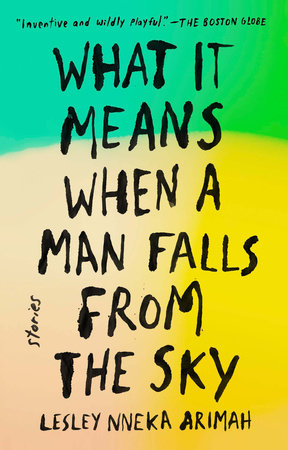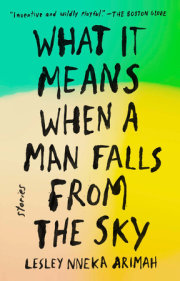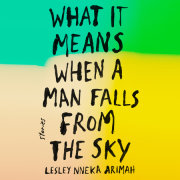The Future Looks Good
Ezinma fumbles the keys against the lock and doesn’t see what came behind her: Her father as a boy when he was still tender, vying for his mother’s affection. Her grandmother, overworked to the bone by the women whose houses she dusted, whose laundry she washed, whose children’s asses she scrubbed clean; overworked by the bones of a husband who wanted many sons and the men she entertained to give them to him, sees her son to his thirteenth year with the perfunction of a nurse and dies in her bed with a long, weary sigh.
His stepmother regards him as one would a stray dog that comes by often enough that she knows its face, but she’ll be damned if she’ll let him in. They dance around each other, boy waltzing forward with want, woman pirouetting away. She grew up the eldest daughter of too many and knows how the needs of a child can drown out a girl’s dreams. The boy sees only the turned back, the dismissal, and the father ignores it all, blinded by the delight of an old man with a young wife still fresh between her legs. This one he won’t share. And when the boy is fifteen and returns from the market to find his possessions in two plastic bags on the front doorstep, he doesn’t even knock to find out why or to ask where he’s supposed to go, but squats with other unmothered boys in an abandoned half-built bungalow where his two best shirts are stolen and he learns to carry his money with him at all times. He begs, he sells scrap metal, he steals, and the third comes so easy to him it becomes his way out. He starts small, with picked pockets and goods snatched from poorly tended market stalls. He learns to pick locks, to hot-wire cars, to finesse his sleight of hand.
When he is twenty-one, the war comes, and while people are cheering in the streets and shouting “Biafra! Biafra!” he begins to stockpile goods. When goods become scarce, he makes his fortune. When food becomes scarce, he raids farms in the dead of night, which is how he will meet his wife, and why Ezinma, fumbling the keys against the lock, doesn’t see what came behind her: her mother at age twenty-two, not beautiful, but with the fresh look of a person who has never been hungry.
Her mother is a brash girl who takes more than is offered. It’s 1966, months before everything changes, and she is at a party hosted by friends of her parents and there is a man there, yellow skinned like a mango and square jawed and bodied like the statue of David, wealthy; the unmarried women strap on their weaponry (winsome smiles, robust cleavage, accommodating personalities) and go to war over him. When she comes out the victor, she takes it as her due.
Almost a year into their courting, the war comes. Her people are Biafra loyalists, his people think Ojukwu is a fool. On the night of their engagement party only her people attend. And when she goes by his house the next day, she discovers he has left the country.
Her family is soon forced to flee the city, soon forced to barter what they have been able to carry, soon forced to near begging, and for the first time in her life, food is so scarce she slips into farms at night and harvests tender tubes of half-grown corn in stealth. They boil so soft she eats the inner core and the fibrous husk, too. One night, she finds a small farm tucked behind a hill and there she encounters a man stealing the new yams that would have been hers. There is no competition; he is well fed and strong, and even if she tried to raise an alarm out of spite, he could silence her. But he puts his finger to his lips and gives her a yam. And being who she is, she gestures for two more. He gives her another one and she scurries away. The next night when she returns to the farm, he is waiting for her. She sits by him and they listen to crickets and each other’s breathing. When he puts his arm around her, she leans into him and cries for the first time since her engagement party many months ago. When he puts a yam in her lap, she laughs. And when he takes her hand, she thinks, I am worth three yams.
She will have two daughters. The first she names Biafra out of spite, as though to say, Look, Mother, pin your hopes on another fragile thing. And the second is named after her mother, who has since died and doesn’t know that her daughter has forgiven her for choosing the losing side and named her youngest child Ezinma, who fumbles the key against the lock and doesn’t see what came behind her: her sister, whom everyone has taken to calling Bibi, because what nonsense to name a child after a country that doesn’t exist.
Bibi, who is beautiful in a way her mother never was. Bibi, stubborn like her mother was always. They’ve fought since Bibi was in the womb, lying so heavy on her mother’s cervix a light jog could have jostled her out. Bedridden, Bibi’s mother grew to resent her and stewed so hot the child should have boiled in her belly. And three years later, Ezinma, pretty, yes, but in that manageable way that causes little offense. She is a ghost of Bibi, paler in tone and personality, but sweet in the way Bibi can be when Bibi wants something. Bibi loathes her. No, Ezinma can’t play with Bibi’s toys; no, Ezinma can’t walk with Bibi and her friends to school; no, Ezinma can’t have a pad, she’ll just have to wad up tissues and deal with it. Ezinma grows up yearning for her sister’s affection.
When Bibi is twenty-one and her parents are struggling to pay the university fees, she meets Godwin, yellow skinned and square jawed like his father, and falls in love. She falls harder when her mother warns her away. And when her mother presses, saying, You don’t know what his people are like, I do, Bibi responds, You’re just angry and bitter that I have a better man than you, and her mother slaps her and that’s the end of that conversation. Ezinma serves as go-between, a role she’s been shanghaied into since her youth, and keeps Bibi apprised of all the family news, despite their mother’s demands that Ezinma cut her off.
And Godwin is a better provider than Bibi’s -father, now a modest trader. He rents her a flat. He lends her a car. He blinds her with a constellation of gifts, things she’s never had before, like spending money and orgasms. The one time she brings up marriage, he walks out and she can’t reach him for twelve days. Twelve days that put the contents of her bank account in stark relief; twelve days that she sits in the flat that’s in his name, drives the car also in his name, and wonders what is so precious about this name he won’t give to her. And when he finally returns to see her packing and grabs her hair, pulling, screaming that even this is his, she is struck . . . by his fist, yes, but also by the realization that maybe her mother was right.
The reunion isn’t tender. Bibi’s right eye is almost swollen shut and her mother’s mouth is pressed shut and they neither look at nor speak to each other. Her father, who could never bear the tension between the two women, the memories of his turbulent childhood brought back, squeezes Bibi’s shoulder, then leaves, and it is that gentle pressure that starts her tears. Soon she is sobbing and her mother is still -stone-faced, but it is a wet face she turns away so no one can see. Ezinma takes Bibi to the bathroom, the one they’ve shared and fought over since they were old enough to speak. She sits her on the toilet lid and begins to clean around her bruises. When she is done, it still looks terrible. When Bibi stands to examine her face, they are both in the mirror. I still look terrible, Bibi says. Yes you do, Ezinma replies, and they are soon laughing, and in their reflection they notice for the first time that they have the exact same smile. How have they gone this long without seeing that? Neither knows. Bibi worries about her things that are still in the flat. Ezinma says not to worry, she will get them. Why are you still nice to me? Bibi asks. Habit, Ezinma says. Bibi thinks about it for a moment and says something she has never said to her sister. Thank you.
And so Ezinma fumbles the keys against the lock and doesn’t see what came behind her: Godwin, who grew up under his father’s corrosive indulgence. Godwin, so unused to hearing no it hits him like a wave of acid, dissolving the superficial decency of a person who always gets his way. Godwin, who broke his cello when he discovered his younger brother could play it better, which is why he came to be here, watching Ezinma—who looks so much like her sister from -behind—fumbling the unfamiliar keys against the lock of Bibi’s apartment so she doesn’t see who comes behind her: Godwin, with a gun he fires into her back.
Copyright © 2018 by Lesley Nneka Arimah. All rights reserved. No part of this excerpt may be reproduced or reprinted without permission in writing from the publisher.







